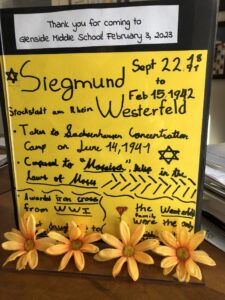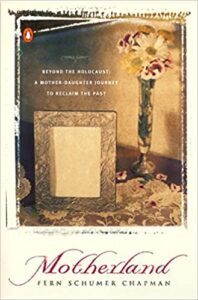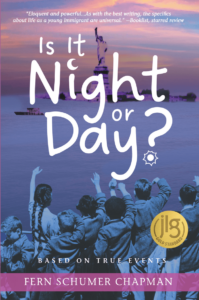
Projects from John Hersey High School
Book Reflection - Is It Night or Day?
RECOVER
- What is the author's purpose?
- What was your favorite part of the book? Pick a specific passage from the book and write down why you liked it?
QUESTIONS
- Was there anything you did not understand?
- What questions do you have for the author and what would like to ask her when she speaks to us?
APPLICATION
- How and why is this book useful today?
- Was there anything in the book you related to or a similar experience you have gone through yourself?
- Why do you think the author named the book, Is it Night or Day?
Projects from John Hersey High School
More Questions on Is It Night or Day?
Answer these questions as you read the book Is it Day or Night? Make sure you answer each question fully in at least 3 sentences.
Chapters 1 & 2:
On page 35 Tiddy expresses, "My family was gone; my childhood over." In what ways it this a true statement? How had Nazi policies in a sense end Tiddy's childhood? What was she about to experience?
Chapters 3 & 4:
Life was so horrible in Germany for Jews. Coming to America was a way for them to avoid a life of discrimination, violence, and hatred. If this is the case, why would many of them be so sad to leave?
Chapters 5 & 6:
Tiddy expresses that she had memorized her new address in Chicago because, "It was the only thing anchoring me to a future." What does she mean? Why was her address in Chicago so important to her? (Other than the fact that she would not be able to find her uncle's home without it). What emotions do her attachment to the address reflect?
Chapters 7 & 8:
What would you say to the people taking in your child? What do you think the hardest part about living at her aunt and uncle's was?
Chapters 9 & 10:
What did Tiddy's parents need to have in order to get out of Germany? Please react to her mother's letter on pages 134-136. Why do you think Julius treated Edith they way he did?
Chapters 11 & 12:
Explain the importance Hank Greenburg held for the Jewish population. Is Aunt Mildred a rescuer? How did Dorothy's opinion change?
Chapters 13 & 14:
Should Tiddy have been labeled an "enemy alien?" How did this affect her?
Chapters 15 & 16:
What do you think were the main messages of Mina's letter? How do the blue and gold star banners affect Tiddy? Is the conclusion of the novel hopeful or not?
Afterward:
How do you feel about helping refugees? Think about Syria. Has your opinion changed after reading this book?
Another School Project
Family Story: A response to Is It Night or Day?
As a follow-up activity to reading Is It Night or Day?, we will be writing a family story. Each student is responsible for investigating a story (oral tradition) from the past; it can be a funny story, sad story, serious story, incredible story, etc. that has been passed down from generation to generation. If you cannot think of a story right away, spend some time talking to parents, grandparents, etc. They may be able to help you to think of a story that you can tell your own children someday!
RUBRIC:
Typed, double spaced, at least one page in length, size 12 font
| Grammar, spelling, punctuation, etc. | 25 | ||
| Interesting details, content, evidence of some research into story. Should have a beginning, middle, and end! (In other words, a plot!) | 25 | ||
| Loudness, expression, fluency as you read it out loud | 25 | ||
| Total | 100 |
A Letter to Fern Schumer Chapman - for all books
Typed, double-spaced. If not typed, written neatly with parent note.
Rubric:
| Requirements | Pts. | Pts. | Comments |
| First paragraph: Tell Fern your general thoughts/feelings/impressions about the book | 15 | ||
| Second paragraph: Passage from book which shows something "essential" to book: explain passage thoroughly! Why is it important to you? How did this passage "speak" to you? | 15 | ||
| Third paragraph: "Free choice" paragraph. You may want to use a "Writing About Reading" opener (see below) | 15 | ||
| Fourth paragraph- wrap-up, thank her, final thought | 15 | ||
| Total | 100 |
Writing About Reading Openers - for all books
I was surprised when/angry about/satisfied with/moved by/incredulous at….
I liked the way you…
I noticed how you….
I don't get why you….
If I were the main character, I would have…
I'd compare your writing to…
This book reminded me of…
The main character…
The character development…
The narrative voice…
The structure of this book…
The climax of the plot…
The resolution of the main character's problem…
I'd say the theme of this book is…
I think that you wrote the book because….
I wish that…
I didn't agree with…
I understood…
I couldn't understand…
Your book changed the way I think because….
I would rate this book a _____ because….
Project for Facing the Past
After reading Facing the Past, ask students to do some research at the United States Holocaust Memorial Museum website. Students can select someone who was displaced or murdered during the Holocaust and learn about his or her life. Then, ask students to create a stolpersteine or stumbling stone on yellow construction paper to memorialize the victim. One student at Glenside Middle School created a "stone" to remember my grandfather, Siegmund Westerfeld, and presented his work to me when I visited his school.
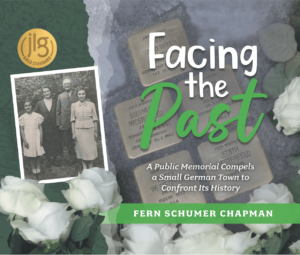
Projects for all of the books from Century Junior High School
Amy Hamernick
Media Specialist, Century Jr. High School
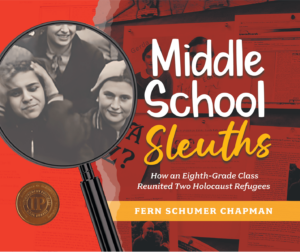 Middle School Sleuths (Station 1)
Middle School Sleuths (Station 1)
This book is divided up into 3 sections. History, Research, and Reunion. There are no page numbers, so pay attention to the section title pages.
1. Explore the History section of this book. List 3 different experiences of Edith’s history as a child escaping Nazi Germany.
1.
2.
3.
2. Explore the Research section of this book. What types of primary sources were accessed and created as the students discovered more about Gerda Katz?
3. Your own thoughts. Tell about a part of this book that you discovered on your own. Was it a picture? A quote? A primary source? Why did it stand out to you? Why did you connect with it?
 Is It Night or Day? (Station 2)
Is It Night or Day? (Station 2)
Start with reading the Author’s Note with your partner.
1. Why is it important to read the Author’s Note of Is It Night or Day before starting the rest of the book?
Continue onto Chapter 1, and take turns reading two paragraphs at a time with your partner. After (5) minutes, stop reading and answer the last question.
2. What emotions does the author bring to light in this first chapter? Was there anything that you read that stood out to?
 Facing the Past (Station 3)
Facing the Past (Station 3)
Much of this book focuses on atonement. Definition of Atonement:
● reparation for an offense or injury
● a story of sin and atonement
Example: He wanted to find a way to make atonement for his sins.
1. Explore pages 13-16. Describe the Stumbling Stones project. Do you think it is more or less impactful than one single monument? Why?
2. Read pages 27-29. Why is the statement that is read aloud to the Schumers so important to atonement?
3. The theme of Stumbling On History is to not simply forget and ignore the past, but for countries to take historical responsibility, atonement, and public memorialization of victims of social injustice. Some have said it is best to let go of past pain and focus on the present. Others argue that by forgetting the past, one gives wrongdoers a final victory. What is your opinion about remembering past pain and injustice?
Read the Prologue with your partner. Answer the following questions:
1. The author lists everything her mother lost at the end of the first paragraph. Of the five things lost, which would you consider the most serious? Why? Which loss would most devastate you?
Read the first three pages of Chapter 1, and take turns reading two paragraphs at a time with your partner. Then, answer the last question.
2. What type of text is this? Give evidence from the text to support your answer.
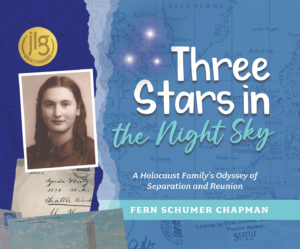 Three Stars In The Night Sky (Station 5)
Three Stars In The Night Sky (Station 5)
This book describes the wrenching experiences of unaccompanied minor refugees, specifically the dislocating traumas suffered by Edith’s friend, Gerda Katz, who at the age of twelve, fled Nazi Germany and ventured to America.
1. Compare and contrast the photographs on pages 1 and 2. What emotions did you experience looking at the photographs?
Page 1 Photograph:
Page 2 Photograph:
Emotions:
2. Explore pages 19-36. The term “culture shock” refers to the deep confusion and disorientation people feel when they move from one country to another. In what ways did the Katz family suffer from “culture shock” when they moved to the Dominican Republic?
3. Your own thoughts. Tell about a part of this book that you discovered on your own. Was it a picture? A quote? A primary source? Why did it stand out to you? Why did you connect with it?
Video: Edith Westerfield and Gerda Reunited (Station 6)
Watch the video (linked in your Social Studies Google Classroom) of the author’s mother reunited with her long-lost friend, and then answer the following question.
1. Describe the emotions that Edith and Gerda were feeling prior to their reunion. Describe your own feelings and reactions to watching them meet each other again.
Book Checkout/Renew/Return (Station 7)
When you come to Station 7, check your Destiny Discover account (make sure to access it by going through the app D135 Media on your iPad) and check to see if you have overdue/lost books. Take care of your library business at this station- renew if you still want to keep your book, return if you are done with it, and checkout a new one if you need a new book.

